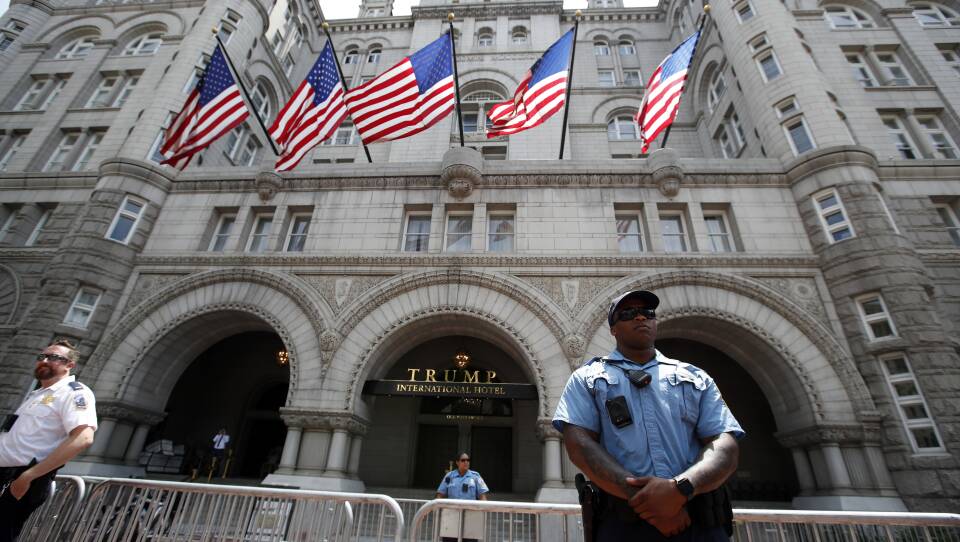News that one of President Trump's Florida hotels would host the G7 summit — followed by the abrupt decision to abandon that plan — has revived concerns about a legal issue that's been overshadowed in recent months by many other controversies. That legal issue involves a provision of the Constitution called the emoluments clause. Northeastern Law Professor and WGBH News Legal Analyst Daniel Medwed joined WGBH's Morning Edition to discuss the emoluments clause. The transcript below has been edited for clarity.
Joe Mathieu: We could go on a lot of places with this one. But now that we've discussed this topic before, back in 2018, I'd like to go back to square one here and just remind us of what the language actually is in the emoluments clause, because so many people are talking about it without reading.
Daniel Medwed: Sure. Before Inauguration Day 2017, I would have been hard pressed to describe it to you. But but here's the actual language. It's an Article 1, Section 9 of the Constitution, and it prevents a person holding federal office from accepting "any present, emolument, office or title of any kind, whatever from any king, prince or foreign state." Now, it emerged out of a fear that wealthy Europeans would ply American ambassadors with gifts and somehow curry favor and influence foreign policy. And back in the 1700s, that was a real concern. Benjamin Franklin famously received a diamond encrusted box from the king of France. And that caused titillation all through the upper crust, this concern that the French would dictate our foreign policy. That's what led to the emoluments clause.
Joe Mathieu: Well, that word, "whatever," seems to cover pretty much everything. But we should be specific here about the definition of a emolument with regards to this case before we move on.
Daniel Medwed: Well, the term itself derives from Latin, and it loosely translates as profit benefit or advantage of any kind, typically, compensation for services rendered. Notably, the U.S. Supreme Court has never had occasion, as far as I can tell, to interpret the precise meaning of the phrase "emoluments." That might change, of course, because there are many Trump-related emoluments clause cases percolating in the lower federal courts. They may eventually bubble up to the U.S. Supreme Court.
Joe Mathieu: Let's talk about those. We talked about his hotel, for instance. What's happening with these lower court cases that you mentioned?
Daniel Medwed: Much of the litigation surrounds the Trump International Hotel in Washington, D.C., just a stone's throw from the White House. Many foreign dignitaries have rented huge batches of rooms, conference spaces, spent a lot of money on food and lodging. And, of course, that has indirectly benefited President Trump, because he's refused to divest his financial interest in that property. That led a number of plaintiffs, including the attorneys general of D.C. and Maryland, to file a lawsuit against him. The claim is that the emoluments clause doesn't only prohibit direct benefits — the envelope of cash handed over to a federal officer — but also indirect or passive benefits like this one.
Now, notably over the summer, it looked like that case was dead in the water. A three judge panel of the 4th Circuit Court of Appeals, which is the federal appellate court that covers the Maryland-D.C. area, ruled that the attorneys general, the plaintiffs here, lacked what's called standing to sue the president. They hadn't been injured or aggrieved by the presence of the hotel. They couldn't proceed in a lawsuit. But just last week, literally a few days ago, a full panel of the 4th Circuit reversed course and decided to rehear arguments on the standing issue. Those arguments are set up for later this year.
Joe Mathieu: So the emoluments clause then does not dictate profit margin. It's not about the actual profit in dollars, necessarily, that the president has suggested is what we're talking about. Because he was going to do it at no cost. That doesn't matter, according to this. As we get back to the G-7 here in Doral, would that have been a stronger claim of emoluments than the other allegation?
Daniel Medwed: I think it would have been a much stronger claim. And here's why. On the one hand, the problem with the Trump International Hotel in Washington, D.C. litigation is essentially, it was an indirect benefit. If, say, a Turkish diplomat decided to stay at that hotel and spend money, it was up to him. It's his decision, even though it might have been influenced by the relationship with President Trump.
But on the other hand, by awarding the G-7 contract for lodging to one of his properties, the Doral in Florida, that would have been a direct or active benefit. You essentially would have had no choice but to book rooms at that establishment and lead to the profit for the president. Now, as you noted, Joe, the president would probably said, "Hey, I didn't get a benefit. There was no markup here. It was at cost." But what about all the free publicity? What about that? That would cost millions and millions of dollars to get that type of publicity. But we'll just have to see. Fortunately, I think we're avoiding that particular legal snafu. We'll just have to focus on the Trump International Hotel ones for now.




